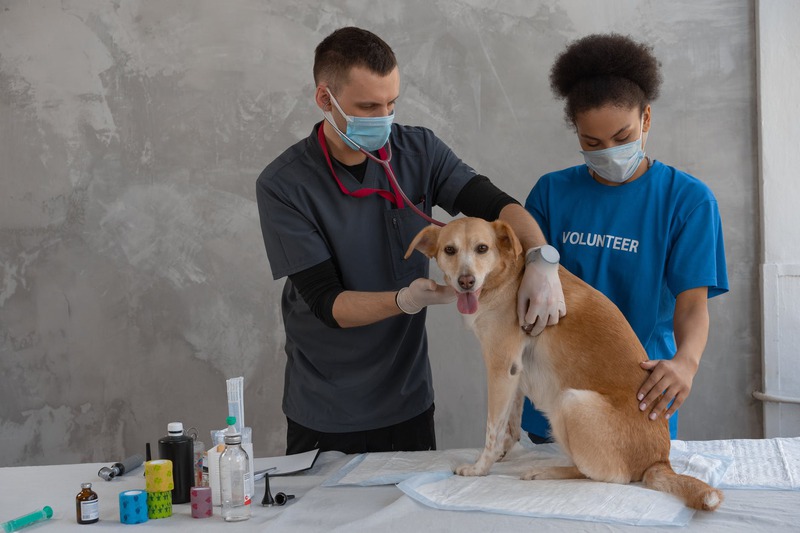Caring for our furry companions includes monitoring their overall health and well-being. One key aspect of pet health is their heart. Heart problems can affect both dogs and cats, and early detection is crucial for the best possible outcome. In this article, we’ll guide you through identifying signs of heart issues in your pets and provide information on diagnosis, treatment, and management options.
We’ll help you keep your pet’s heart healthy and happy with helpful tips and expert insights.
Recognizing Signs of Heart Problems in Pets
Common Symptoms in Dogs
Lethargy, coughing, and an increased resting respiratory rate are early warning signs of heart problems in dogs. Observed changes in these symptoms should prompt a visit to the vet for further evaluation.
Common Symptoms in Cats
In cats, increased reclusiveness, loss of appetite, and respiratory difficulty may indicate heart issues. It’s essential to pay attention to your cat’s behavior and note any changes or patterns.
Most Susceptible Dog Breeds to Heart Problems
Large Breed Dogs Prone to Dilated Cardiomyopathy
Large breed dogs, such as Great Danes, Dobermans, and Boxers, are more likely to develop dilated cardiomyopathy. This condition involves the enlargement of the heart muscle, reducing its ability to pump blood effectively.
Breeds Prone to Heart Murmurs
Cavalier King Charles Spaniels, for example, are particularly susceptible to heart murmurs, with many developing murmurs by age five.
Breeds Predisposed to Valve Disease
Poodles, Pomeranians, and Schnauzers are breeds that tend to be predisposed to valve disease, affecting their heart’s functionality.
Breeds Less Likely to Develop Heart Disease
Some Terriers, such as Scotties, Westies, and Cairns, appear to be less prone to heart disease compared to other small dog breeds.
Most Susceptible Cat Breeds to Heart Problems
Maine Coons, Ragdolls, Bengals, Sphynxes, and American Shorthair cats are more likely to develop hypertrophic cardiomyopathy, a condition causing the left ventricle to thicken and impede blood pumping to the aorta.
Diagnosing Heart Problems in Pets
When diagnosing heart issues, vets rely on the “triad of care,” which involves the pet owner, primary veterinarian, and specialist working together to address the pet’s needs. A thorough medical history, physical examination, and diagnostic tests like echocardiograms and chest X-rays help determine the nature and severity of heart problems in pets.
Cardiology Pet Care
Vet Cardiologist
When searching for cardiology pet care, finding an experienced vet cardiologist in Denver or Boulder, or your local area is essential. These professionals specialize in diagnosing and treating heart problems in pets and can offer expert advice on maintaining your pet’s heart health.
Cardiology Veterinary Clinic
The right cardiology veterinary clinic can significantly affect the health and quality of life of pets with heart issues. These clinics employ specialists in cardiac-related problems, ensuring your pet receives the appropriate care and treatment. If you are looking for a reputable cardiology veterinary clinic, click here.
PDA Occlusion Surgery
Patent Ductus Arteriosus & Surgery
For some pets with heart problems, PDA occlusion surgery may be recommended. This procedure closes the patent ductus arteriosus, a blood vessel that allows blood to bypass the lungs during fetal development. Closing this vessel can help improve circulation and heart function. When considering this surgery, it’s essential to have their contact info readily available to consult with the veterinary surgeon and address any concerns or questions regarding your pet’s treatment.
Treatment and Management Options for Pets with Heart Problems
Early Detection and Intervention in Dogs
For dogs, early detection of heart issues can significantly impact how well they respond to treatment. Studies like the EPIC Trial have shown that drugs like Vetmedin can help extend the pre-failure period in dogs with early-stage heart problems.
Early Intervention in Cats
Although no specific study in cats demonstrates the benefits of early intervention, it’s believed that early diagnosis and treatment can improve the quality of life for feline companions with heart conditions.
Promoting Heart Health in Pets
To ensure your pet’s cardiovascular health, schedule regular veterinary check-ups, maintain a healthy diet, and monitor their weight. Additionally, exercise and mental stimulation are critical in maintaining overall well-being, directly impacting your pet’s heart health.
Supporting Pet Owners Dealing with Heart Problems in Their Pets
As a pet owner dealing with heart issues, engaging with support groups or online forums is essential. Communicating with other pet owners and veterinary professionals can help alleviate stress, provide valuable insights, and improve your ability to care for your beloved companions.
The Takeaway
Heart problems in pets can be challenging to identify and manage, but with proper care, vigilance, and early intervention, your furry friend can lead a happy and healthy life. Regular veterinary check-ups, a healthy lifestyle, and collaboration between pet owners, primary veterinarians, and specialists are instrumental in addressing heart issues in dogs and cats. Stay informed, engage in preventive measures, and understand that, with the right support, your pet’s heart health can be preserved and even improved.





